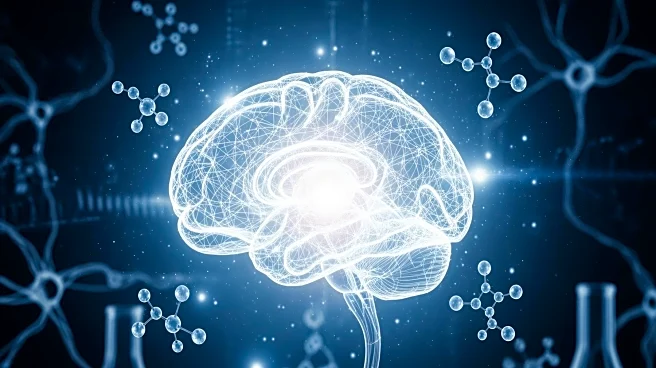What's Happening?
A recent study conducted by researchers at the Salk Institute for Biological Studies has identified a molecule called pleiotrophin as crucial for the development and function of the nervous system, particularly
in the context of Down syndrome. The study, which utilized lab mice, suggests that restoring pleiotrophin could enhance brain function in individuals with Down syndrome and potentially other neurological disorders. The research team, led by Nicola J. Allen, PhD, discovered that pleiotrophin is present at high levels during critical moments of brain development and plays a significant role in forming brain synapses and developing axons and dendrites. The study found that administering pleiotrophin improved brain function in adult mice, indicating that this approach could offer advantages over previous methods that required precise timing during pregnancy.
Why It's Important?
The findings of this study are significant as they provide a potential new avenue for treating Down syndrome, which affects approximately one in 640 babies born annually in the U.S. The condition is caused by a mistake in cell division during development, leading to developmental delays and increased risk for various medical issues. By demonstrating that pleiotrophin can improve brain function, the research offers hope for developing gene therapies or protein infusions that could enhance the quality of life for individuals with Down syndrome. Moreover, the study's implications extend beyond Down syndrome, as the ability to reprogram astrocytes to deliver synaptogenic molecules could benefit other neurological disorders, including fragile X syndrome and Alzheimer's disease.
What's Next?
While the study's results are promising, further research is necessary to fully understand the complex contributors to Down syndrome and the role of pleiotrophin. The researchers caution that pleiotrophin is not the sole cause of brain circuit issues in Down syndrome, and additional studies are needed to explore its potential as a treatment. Ashley N. Brandebura, PhD, who was part of the research team, plans to continue her work at the University of Virginia School of Medicine, focusing on the potential of astrocytes to deliver plasticity-inducing molecules to the brain. This ongoing research could pave the way for new therapeutic strategies for Down syndrome and other neurological conditions.
Beyond the Headlines
The study highlights the potential of targeting astrocytes, a type of brain cell specialized in secreting synapse-modulating molecules, to rewire brain circuitry in adults. This approach could revolutionize the treatment of neurological disorders by enabling the delivery of therapeutic molecules directly to the brain. The research underscores the importance of understanding the molecular mechanisms underlying brain development and function, which could lead to innovative treatments for a range of conditions. The ethical and practical implications of such treatments will need to be carefully considered as research progresses.










